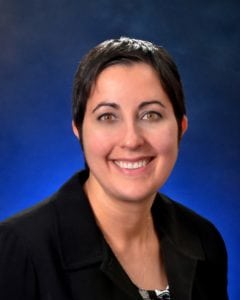The Trager Transplant Center at Jewish Hospital joined with representatives from Kentucky Organ Donor Affiliates (KODA) in July to dedicate a new “Donate Life” flag that will be permanently on display in the lobby of the Trager Transplant Center.
The purpose of the flag is to remind people of the importance of organ donation.
Every day, 22 people die, while waiting for an organ, because not enough people have signed up to be donors. At this moment, more than 1,000 Kentuckians are waiting and praying for an organ that can save their lives. Many of them are at Jewish Hospital, too ill to leave their rooms.
In Judaism, we recognize the sanctity of life, celebrating with “l’chayim” and prioritizing it in the way we follow Jewish law. This flag is a reminder of the sacred obligation to encourage more people to donate. For grieving families, it can bring great comfort to know that their loss has been transformed into a life-saving gift for others.
At the July 13 ceremony, we were blessed to hear from a transplant recipient, who spoke movingly about how he feels called to live for two people, as well as the mother of a transplant donor, Shelly Adkins, who also serves as philanthropy officer for Trust for Life. She shared the following:
“My 6-year-old son, Keegan, in his final act of kindness, became an organ donor; saving the lives of four children and one adult. Keegan became my First Responder family’s newest hero. We always knew that our little Keegan would have grown up to be a policeman, firefighter or paramedic, and although his life was cut short, he was still able to complete his earthly mission: he became a life saver through organ donation. And with that decision, Keegan not only gave the gift of life to his recipients, but he gave us, his parents, the ultimate gift of peace and comfort on our darkest day. By being an organ donor, he gave us an extended family and a network of resources through KODA. Since the day Keegan went to Heaven, we’ve been supported, held up, and given an outlet for our grief through these organizations, specifically, the Donor Family Aftercare program. We are surrounded by other families who truly understand what we’re going through, and our loved ones are honored and remembered for the lives they saved with touching ceremonies and memorials.
“Most recently, through the success of KODA’s Aftercare program, I was able to correspond with several of our son’s organ recipients, and I’m so happy to report that on June 26, we met the first of five: a beautiful, healthy, 15- year-old girl who lives her life with purpose and passion. Just a few days after that, the recipient of one of his kidneys, whom I’ve yet to meet, informed me that one of her grandsons was given the name Keegan, named after the hero that gave her a kidney. Granted, our lives will never be whole again, and grief is something we will live with for the rest of our lives. But because there are five people alive today all because of my little man, I live with a peace and a deeper understanding of what love for our fellow man truly is.”
Working at Jewish Hospital, we are blessed to hear and witness miraculous and moving stories such as this every day. The talented and dedicated health care team that treats our patients and their families is truly phenomenal, and I am blessed and inspired by them every day.
Over the past year, the Trager Transplant Center, in collaboration with the University of Louisville, has experience marked growth. Along with surpassing several historical milestones, more organs have been transplanted than ever before in the program’s 53-year history, including the 500th heart, 900th liver, 3,000th kidney and 5,000th organ overall.
But what is most encouraging is that, with each organ transplanted, another network of friends and families become sensitized to the miraculous alchemy that transforms grief into life-saving medicine. The number of people who have been helped by our transplant program is truly amazing, and a reason to be proud.
With the High Holy Days around the corner, as we contemplate the prayers that remind us of our own mortality, may we be inspired to have the conversations and make the decisions that can bring blessings to others.
(Rabbi Nadia Siritsky is vice president of mission at KentuckyOne Health.)



